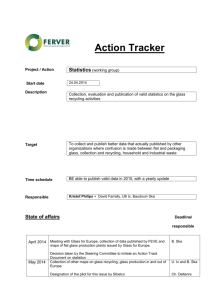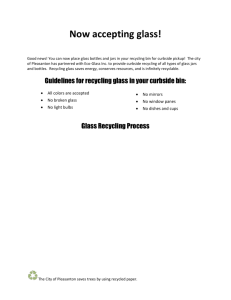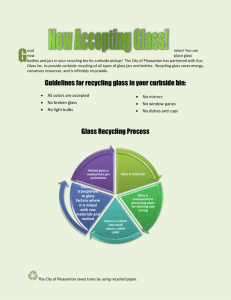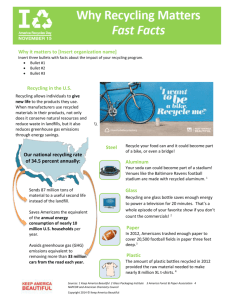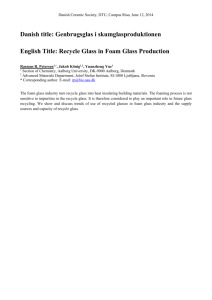Glass Recycling
advertisement
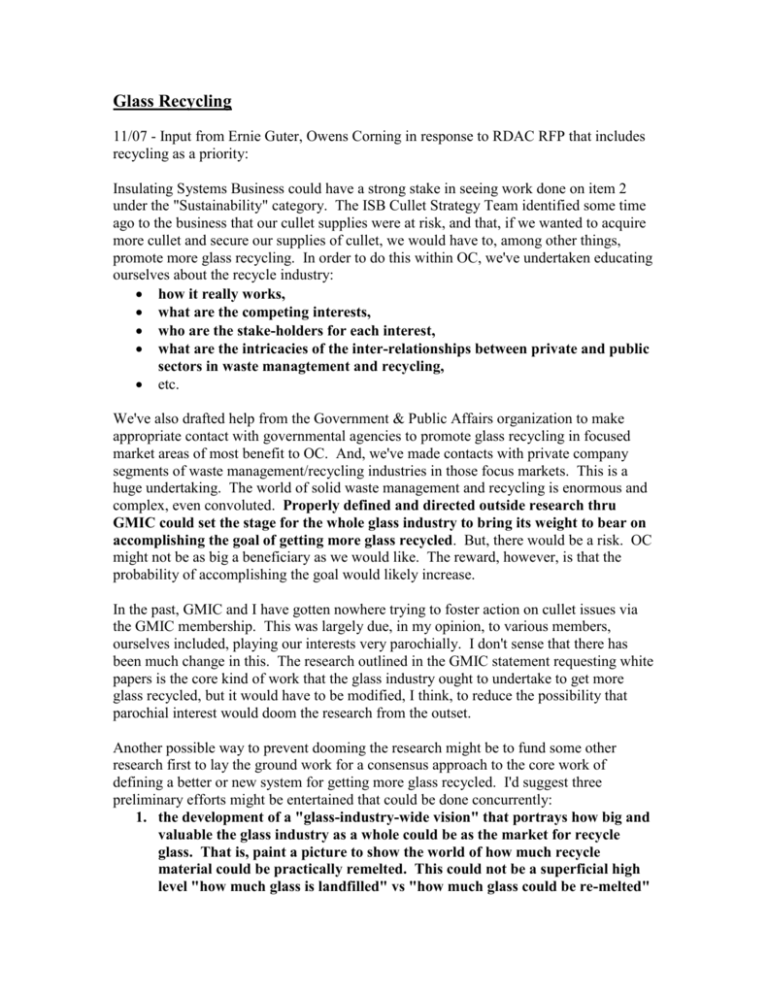
Glass Recycling 11/07 - Input from Ernie Guter, Owens Corning in response to RDAC RFP that includes recycling as a priority: Insulating Systems Business could have a strong stake in seeing work done on item 2 under the "Sustainability" category. The ISB Cullet Strategy Team identified some time ago to the business that our cullet supplies were at risk, and that, if we wanted to acquire more cullet and secure our supplies of cullet, we would have to, among other things, promote more glass recycling. In order to do this within OC, we've undertaken educating ourselves about the recycle industry: how it really works, what are the competing interests, who are the stake-holders for each interest, what are the intricacies of the inter-relationships between private and public sectors in waste managtement and recycling, etc. We've also drafted help from the Government & Public Affairs organization to make appropriate contact with governmental agencies to promote glass recycling in focused market areas of most benefit to OC. And, we've made contacts with private company segments of waste management/recycling industries in those focus markets. This is a huge undertaking. The world of solid waste management and recycling is enormous and complex, even convoluted. Properly defined and directed outside research thru GMIC could set the stage for the whole glass industry to bring its weight to bear on accomplishing the goal of getting more glass recycled. But, there would be a risk. OC might not be as big a beneficiary as we would like. The reward, however, is that the probability of accomplishing the goal would likely increase. In the past, GMIC and I have gotten nowhere trying to foster action on cullet issues via the GMIC membership. This was largely due, in my opinion, to various members, ourselves included, playing our interests very parochially. I don't sense that there has been much change in this. The research outlined in the GMIC statement requesting white papers is the core kind of work that the glass industry ought to undertake to get more glass recycled, but it would have to be modified, I think, to reduce the possibility that parochial interest would doom the research from the outset. Another possible way to prevent dooming the research might be to fund some other research first to lay the ground work for a consensus approach to the core work of defining a better or new system for getting more glass recycled. I'd suggest three preliminary efforts might be entertained that could be done concurrently: 1. the development of a "glass-industry-wide vision" that portrays how big and valuable the glass industry as a whole could be as the market for recycle glass. That is, paint a picture to show the world of how much recycle material could be practically remelted. This could not be a superficial high level "how much glass is landfilled" vs "how much glass could be re-melted" exercise. It would have to have some deep investigation into the distribution of glass production across North America, the distribution of consumer consumption, issues of practical ways to re-assemble quantities of glass, etc. 2. conduct a detailed analysis by geographic region of the characteristics of the recycle glass streams, that is, identify volumes and color distributions, and match those characteristics with in-region glass industry available to consume the material. Basically, this is an investigation into whether and how it might be possible for the glass industry to equitably divide up the recycle glass streams so each user is supplied and the industry as a whole benefit both from access to more cullet and from the stewardship story that could be told, and 3. develop an in-depth economic and environmental case why alternate uses of glass such as landfill cover and roadbed aggregate are not the most beneficial use of glass and should not be considered, as is now the case in many places, recycling. Owens Corning, of course, could undertake segments of this kind of research internally, and, in a limited way, we are. If the glass industry could come to terms among ourselves regarding how to achieve the common goal, much more progress could be made much sooner. But, coming together is not a simple proposition at all, and I don't sense that the prospects are good for it happening. -Mike Studley – Organic Waste Remediation – mpstudley@cfl.rr.com Cell: 407-4482398 -Groton, CT facility projected. -Process all waste: avoid shredding, maintain integrity of material; separate recyclables from waste – Move away from manual sorting. MSS Equipment – Nashville makes equipment. -250 tons/day – recycle 75% of garbage, including glass, equipment to optically sort glass. 98% ceramic free -Glass sorter will separate into clear, brown and green, 95% good on first pass. Run through a second time to get better quality. -In 5 yrs. Expect to expand to 3,600 tons of cullet per day. -Use pyrolysis to break down organics into fuel. -Need $20 million to build first plant = 250 tons per day. Will give them material that meets their spec and costs 20-25% less than virgin materials. -Emissions compared to incinerator is 1/3, compared to best landfill, 1/30. 12/10/07 – Ernie Guter meeting CRI (Container Recycling Institute) DC – Pat Franklin – focus on national bottle bill, but now retired. Tex Corley (CEO of Strategic Materials Institute – SMI) is now President. Curt Bucey attended our meetings several years ago. O-C “Cullet Strategy Team” is Ernie, plus Scott Colangelo at Granville, and John Hutchinson (in Sourcing) in Toledo. Paul Smith – Strategic Cullet Sourcing at O-I. Need to go to communities, and states with a plan to improve their situation. Resource Recycling Magazine has done articles on various areas, but they’re not consistent. Perhaps they might be interested in collaborating to develop a stronger picture: economics, logistics. We need to have a better understanding of the economics of recycling and of the alternatives: Why are materials not recycled? If glass of proper quality and mix could be delivered to a glass plant for $60-70/ton it would be appealing to a glass company, when you take into consideration tipping fees. What universities have studies of this? What are groups that don’t want to recycle? That make money landfilling. Justification for recycling: resource and energy savings Action: -Identify university expertise and interest -Have meeting with Studley -Have thermodynamics person discuss pyrolysis (high vacuum) digester -Discuss with upper management – as part of sustainability issue -Organize meeting face-to-face with 4 or 5 glass company people in Columbus. Set priorities and plan for moving forward.
